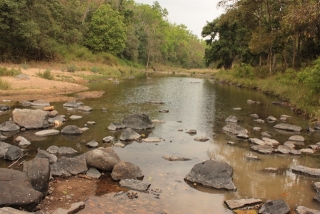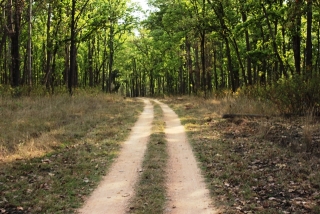/topics/lifestyle
Lifestyle
"Lapodia - Ekti drishtanto" - Bengali translation of Anupam Mishra's booklet by Nirupama Adhikary, about the successful efforts of Lapodia village in Jaipur, Rajasthan in harvesting rainwater
Posted on 19 Sep, 2012 02:57 PMCollective community efforts can help overcome the vagaries of nature and rejuvenate pastures and farms to restore prosperity, says Dr Anupam Mishra in his booklet outlining a case study of Lapodia, a village in Rajasthan.

"Aajao Pukur Aamader" by Nirupama Adhikari - Bengali translation of Anupam Mishra’s book “Aaj Bhi Khare Hain Talaab”
Posted on 21 Jul, 2012 09:49 PM Anupam Mishra is an environmental activist and currently works with the Gandhi Peace Foundation, New Delhi. The inspiring contribution dealing with the indigenous water systems of central India has been translated by Nirupama Adhikari into Bengali.
Anupam Mishra is an environmental activist and currently works with the Gandhi Peace Foundation, New Delhi. The inspiring contribution dealing with the indigenous water systems of central India has been translated by Nirupama Adhikari into Bengali.
"Taral Darpane Samajer Mukh" by Joya Mitra – Bengali translation of Anupam Mishra's booklet "Tairne Wala Samaj Doob Raha Hai" on floods in Bihar
Posted on 21 Jul, 2012 04:19 PM
The second edition of the book came out in 2008 just after the devastating Bihar floods in the year when the river thundered down from the Himalayas on its way to the sea sweeping half of Bihar.
Occupational health hazards in sewage and sanitary workers - A paper published in the Indian Journal of Occupational and Environmental Medicine
Posted on 04 May, 2012 03:59 PMWorking conditions of the sanitory workers have found to remain unchanged over the years and pose a considerable risk to the dignity and health of the workers.
The original Jungle Book: A visit to Kanha National Park, Madhya Pradesh
Posted on 28 Apr, 2012 12:37 AM

Kanha National Park, Madhya Pradesh
Sikkim’s organic farming to feature in Satyamev Jayate, Aamir Khan’s first television project on DD1
Posted on 27 Apr, 2012 11:36 AMArticle and Image Courtesy : iSikkim
Appointment of young professionals as Prime Minister's Rural Development Fellows - Some questions
Posted on 23 Apr, 2012 11:19 AMThe critics of the PMRDFS have already started asking questions as follows:
The sanitation crisis in India - An urgent need to look beyond toilet provision
Posted on 18 Apr, 2012 12:14 PMGuest post by: Aarti Kelkar-Khambete
Image Courtesy: Wikimedia Commons
The sanitation crisis and the recent evidence on lack of toilet facilities
Rohini Nilekani, Chairperson of Arghyam announces transition in leadership: Jayamala Subramaniam to take over from 1st June, 2012
Posted on 13 Apr, 2012 05:44 PMShe comes to Arghyam with a background in the corporate and not for profit sectors, both in India and abroad. She has a record of achievement in taking initiatives to scale in the financial and education sectors and substantial experience as a coach and mentor.
"Resources, tribes and the State" - A report on an international seminar, organized by the Arunachal Institute of Tribal Studies at Itanagar, Arunachal Pradesh, in February 2012
Posted on 11 Apr, 2012 04:10 PMGuest post by: Raju Mimi





